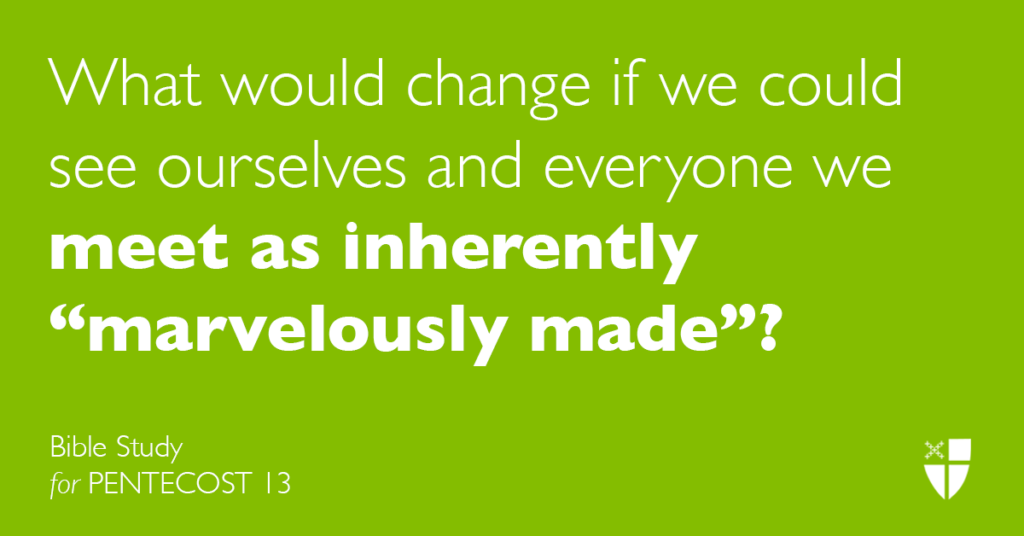This page is available in: Español
Bible Study: Proper 18 (C) – 2019
September 08, 2019
Jeremiah 18:1-11

In this image of the potter and clay, I hear a message about repentance and re-making. God is offering God’s people yet another chance to turn from their self-destructive ways and try again.
A friend of mine has recently begun working with clay, and from her experience I see that throwing a block of clay and shaping it over and over again requires patience, diligence, and a sizeable amount of hopefulness. Even when her pieces turn out a little irregular or not quite the way she hoped, she is still very fond of her creations and can’t bring herself to throw them out.
Throughout the Hebrew Bible, God gives God’s people many—countless, even— opportunities to repent and try again. While it might be tempting to read this passage as a prophecy about destruction, to me it seems more to be an illustration of God’s fondness for created beings and unceasing willingness to allow them to try again.
- In what ways might God be asking you to stop, turn, and try again?
Psalm 139: 1-5, 12-17
I am infinitely grateful for this timeless psalm. Beginning with Adam and Eve’s shame at their nakedness in front of God in the garden to our own multitude of insecurities and even loathing of our own bodies, this psalm responds to ages of human discomfort with our bodies with how intimately and deeply God knows us and loves us.
It is an understatement to say that the Christian tradition hasn’t always handled the realities of our embodiment very well, but this psalm gives us an idea of how God might prefer that we view our bodies: “I will thank you because I am marvelously made; your works are wonderful, and I know it well.”
We know in the abstract that God considers creation good, but we find that harder to believe when it comes to our very own real-life bodies and the bodies of those different from us. Perhaps this psalm is one to write on the bathroom mirror and keep on a note card in the car, the church pew, or the office.
- What would change if we could see ourselves and everyone we meet as inherently “marvelously made”?
Philemon 1-21
This brief epistle of Paul’s is scant in verses but rich in interpretative possibilities. All we know about the context and impetus for this letter is what the letter itself contains, and we can’t be sure of the situation to which Paul is responding. Did Philemon send Onesimus to take care of Paul while he’s in prison? Did Onesimus run away and seek out Paul to intercede on his behalf after he committed some kind of social wrong?
What is clear is that Paul is prepared to use his considerable powers of persuasion to convince Philemon to welcome Onesimus back as warmly as Paul himself would be welcomed. Paul doesn’t command Philemon to do anything, but he makes it clear what he thinks Philemon ought to do. Moreover, Paul knows this letter will be read aloud to the whole household, and he lets that serve as an added nudge to Philemon to do the right thing.
What is apparent, aside from Paul’s keen powers of persuasion, is his affection for Onesimus, whom it seems he brought to Christ during their time together. Paul says of him: “I am sending him, that is, my own heart, back to you.” It is clear that whatever the circumstances, Philemon likely doesn’t see Onesimus the way Paul sees him, and yet Paul must send his “own heart” back out into the world, hoping he will be received as a beloved sibling in Christ. Paul’s challenge to Philemon could be seen as a challenge to each of us, persuading us to see those about whom we have preconceived notions in a new and more loving way.
- Whom might you be challenged to see in a new light, prompted by the understanding that they are someone’s “own heart” walking around in the world?
Luke 14:25-33
Crowds have gathered around Jesus, pushing past each other to hear what he has to say. Casting an eye over the crowd, Jesus sees that they surely don’t realize what a commitment following his path will be. After all, following Jesus requires letting go of things that previously seemed important or alluring and reorienting to a new way of living.
This requirement brings us back to Jeremiah’s words, “Turn now… amend your ways and your doings.” Jesus is reminding those listening that it isn’t possible to maintain the values of the dominant culture when making a commitment to God’s vision for the world. All the possessions and social standing that seemingly help one get ahead aren’t much help when following Jesus’ sacrificial way of living. One cannot merely give lip service to walking in the way of Jesus—it requires an examination of priorities, attachments, and patterns of living. The good news is that doing so lightens our load for the journey so that we are freed to pay attention to where God is moving and how we might join with others in God’s work in the world.
- Do you build in time to pause and re-examine your attachments and priorities? The transition from summer to fall can be a fruitful time to re-evaluate habits and commitments and how we might live in a more Christ-shaped way.
This page is available in: Español
Don’t forget to subscribe to the Sermons That Work podcast to hear this sermon and more on your favorite podcasting app! Recordings are released the Thursday before each liturgical date.
Receive Free Weekly Sermons That Work Resources!
This page is available in: Español


